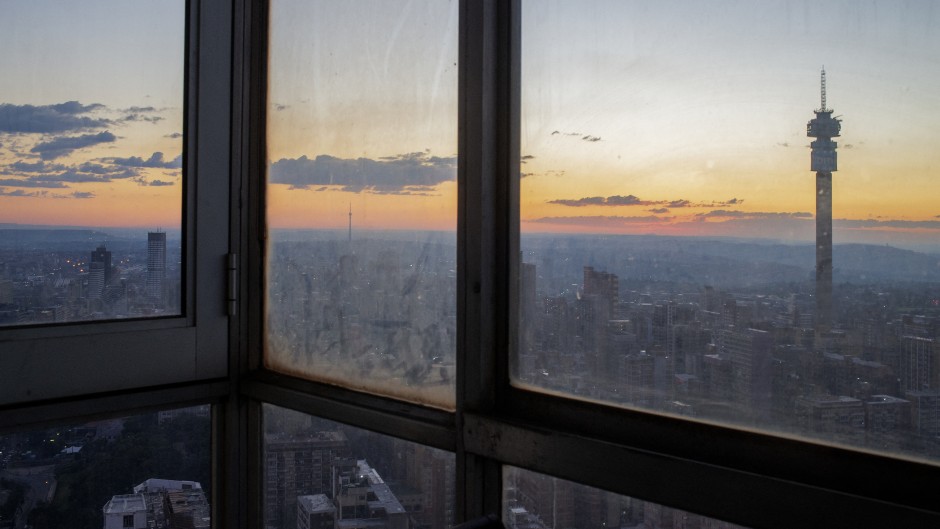Ahead of the election of a new mayor in Johannesburg on Friday, anchor Francis Herd mulls the state of the city.
JOHANNESBURG - In a powerful TV moment this week, my colleague at eNCA, JJ Tabane, played the song ‘Gimme Hope Jo’anna’ accompanied by pictures showing the urban squalor and decay that has come to define parts of Johannesburg, as well as residents scrounging for food. Circumstances have changed since the song was written about life in Jozi under apartheid but – once again – the city needs to provide hope.
It can be surreal to live in Johannesburg. I stay in the Sandton area, long referred to as the richest square mile of Africa. Driving home at night on dimly lit major roads with most of the streetlights seemingly out of order, I have often wondered: if this is what the richest can offer, what hope is there for the rest?
I have a vague memory of going to the CBD with my grandmother in the days when people would get dressed up to go have tea in town’s glamorous department stores. I remember the lights around the movies and restaurants, thinking with delight that that’s where I’d be when I was all grown up. By the time I was a teenager, however, people were already talking about the bar in the Carlton Hotel with nostalgia. To younger people from the suburbs, Joburg’s City Centre was a dangerous unknown.
The City of Gold is still full of riches, of course, but they are no longer buried. They are mostly kept in the corporate towers that moved from the inner city to Sandton and Rosebank years ago. An apartheid poet once contrasted black sweating construction workers on the streets with white executives in air-conditioned offices above them. The divide now seems to be between those who work and those who can’t find a job - any job. In the Joburg in the sky, professionals still work in pristine offices in buildings that glitter in the sun. In the Joburg on the streets, there are beggars at most major intersections despite bylaws designed to protect people from them and the motorists trying to maneuver around them and the numerous potholes. During power cuts, indigent city dwellers found a side hustle directing traffic for handouts while metro officials were awol (or could sometimes be spotted chilling down the road).
As time has passed, the city centre and the new Sandton/Rosebank business hub have moved further apart and it’s becoming harder to imagine they will continue to co-exist forever.
The Joburg City Council, meanwhile, has been the site of a battle for positions. Shifting coalitions have given Johannesburg no less than five executive mayors over the last three years. The ANC’s Dada Morero is set to become the sixth, after a massive lobbying effort forced Al Jama-ah’s Kabelo Gwamanda out. He had been put in place as a compromise candidate from a tiny party by the ANC and EFF. Morero, who was once mayor for less than a month, is one of the executive team that surely must take collective responsibility for Johannesburg’s malaise. Nevertheless, he holds Joburg’s hopes in his hands.
Given the numbers in the council, the ANC and the DA could easily work together to exert tight control over the city. This may have been expected after the DA entered into a Government of National Unity at the national level. However, after the ANC and DA failed to reach an agreement over the allocation of provincial executive positions, the DA chose to remain in opposition. While it’s unclear how the two parties will interact at the municipal level, ActionSA has agreed to support the ANC’s mayoral candidate, which gives the ANC the numbers to govern for now.
However, such tenuous political allegiances remain in danger of shifting, much like Lilian Ngoyi Street, previously Bree Street, which bubbled up a few metres following an underground explosion in the heart of Johannesburg a year ago.
To give the residents of Johannesburg hope, the Rivonia Circle and other civic groups have stopped focusing on the role of the mayor and called for a credible plan to fix the city. It’s unclear where the funds will come from, given Joburg has mountains of bills to pay and seems unable to collect its debt. Eskom had to go to court for an order compelling City Power to pay its more than R1 billion tab and even the debt collectors who came in to try and collect on Johannesburg’s behalf complained they were left unpaid. As journalists, we have to hold leaders to account but also to consider the context. Without a bailout, it would be hard for any mayor to deal with the backlog created by years of political infighting and inaction. Nevertheless, Morero and his new team will carry our hopes and will have to come up with credible plans.
Lilian Ngoyi Street is still in disrepair, but I have noticed a few additional lights shining above on Winnie Madikizela-Mandela Drive when I head home after reading the news of late. Hopefully, these are symbolic flickers of hope ahead of the establishment of a new Johannesburg executive.
By Francis Herd
The information in the posted article represents the views and opinions of the author/commentator and does not necessarily represent the views or opinions of eNCA.


